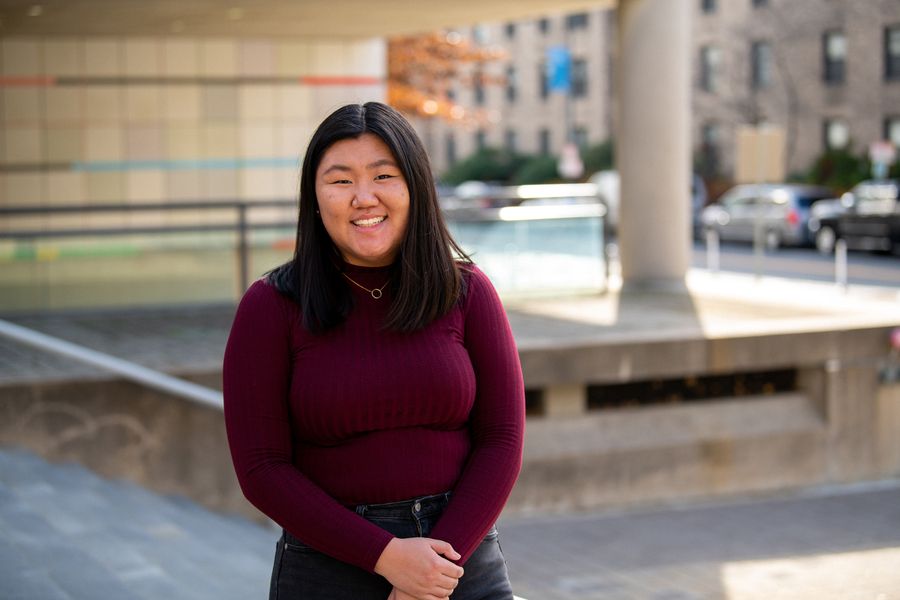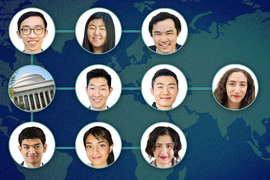Students experiencing discrimination and living through the pandemic have something in common: feeling isolated.
It’s a topic being explored in a paper by senior math and economics major Fiona Chen on remote learning and its effect on academic performance. Chen is using support from the MindHandHeart Innovation Fund and a Peter J. Eloranta Fellowship to perform on a study on how Covid-19 and students’ online activities affect their productivity.
“As the Covid-19 pandemic continues, it’s difficult not to equate social distancing with social isolation, and often the loneliness that comes with our new normal,” said one of the students participating in her study. “I think it’s really important, especially as a college student, to have conversations about the effects of social isolation on our ability to learn from and connect with the people both in and outside of our virtual classrooms.”
Chen’s paper also serves as an appropriate capstone of her time at MIT. As an undergraduate, she has found herself straddling two worlds: economics research, and student advocacy, with her work in The Tech, the Undergraduate Association, and MIT Students Against War.
“The former has provided me the ability to analyze social issues with great precision, while the latter has helped me understand the importance of tangible political action,” she says.
By balancing the two, she hopes to build a career to advocate for individuals whose voices have traditionally been ignored or excluded, particularly those who have faced economic hardships due to social and political inequalities.
Chen grew up with her younger sister in Texas and then in California, children of Chinese immigrants busy juggling parenthood with work and graduate school. Fiona began school in a predominantly white neighborhood, and she only spoke Mandarin; frequent moves made it hard to connect with others.
In high school she joined the debate team, and her world view blossomed. She began to read political literature that analyzed racial, gender, and economic inequalities, and found a support network of women and students of color who cared deeply about fighting for social justice. As she learned more about the “have-not” economy, she began volunteering as a debate coach for other schools that “had just a fraction of the financial resources of my own,” she says.
She came to MIT to study mathematics and economics, inspired by the work of the Abdul Latif Jameel Poverty Action Lab (J-PAL) and professors such as Esther Duflo. As opinion editor for The Tech, Chen says she strove to amplify stories and voices of students whose concerns have often been neglected, such as students who had been mistreated by principal investigators, and survivors of sexual assault, many of whom were working to improve MIT’s mental health support and reporting channels. Chen also co-founded MIT Students Against War to combat MIT’s involvement in military technology research, and organized mass protests and teach-ins.
As an active officer with the Undergraduate Association, she played a crucial role in the early days of the pandemic. She worked with the administration to help move students off campus and to set up remote learning procedures and enhance public health and student life protocols, with a focus on diversity, equity, and inclusion issues. She also used student forums and survey results to help students experiencing poor internet access, inadequate study spaces, mental health challenges, and other stressors. She pushed for the universal pass/no record grading policy for spring 2020, and to make sure that the enforcement of health regulations wouldn’t create a hostile environment on campus.
“We saw so many issues just pop up immediately,” she recalls. “I helped with trying to think through how we can ensure students on campus stay safe without having to impose overly strict rules or enforcement mechanisms.”
Meanwhile, as Chen quarantined in Alameda, she too struggled with the social isolation. “There was a several-month period in the beginning where I didn’t see any people in my same age group. That was very difficult for me to handle mentally,” she recalls.
She returned to her Maseeh pod in the fall, and is spending her final spring semester finishing her paper. She recently was awarded a 2021 Paul and Daisy Soros Fellowship for New Americans, which she will use to pursue a PhD in economics.
Reflecting on her MIT experiences, she admits that “some people might see my profile as being all over the place.”
But she has found that, at least for her, one of the keys to overcoming isolation is to diversify.
“I think the reason why I’m attracted to so many things is that I think everyone has a lot to learn. What I care about is understanding a lot of these issues in a larger social context. I hope that more people understand that there’s an interconnectedness of things in the world, and a futility with staying within individual disciplines.”









